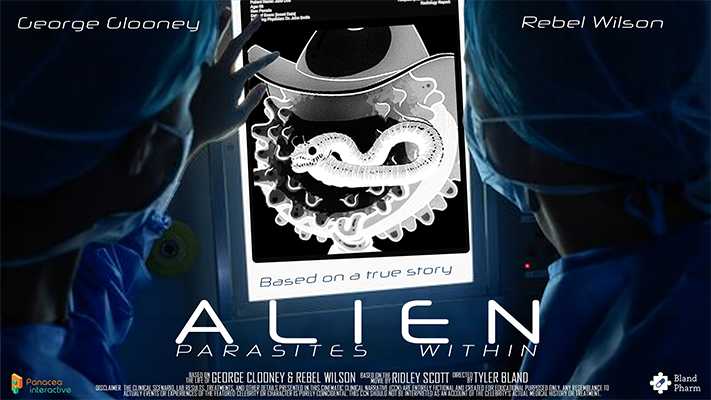
IIDS Generative AI Fellow, Tyler Bland, Publishes in MDPI AI
Antiparasitic Pharmacology Goes to the Movies: Leveraging Generative AI to Create Educational Short Films
April 18, 2025Medical students face a tough challenge: learning an overwhelming amount of complex information quickly. To help make one of the most difficult topics—antiparasitic medications—more engaging and easier to remember, Dr. Tyler Bland and his team created a new way to teach: short, cinematic, educational films powered by artificial intelligence. These Cinematic Clinical Narratives (CCNs) use storytelling, animated visuals, catchy songs, and humor to teach about parasites and the drugs that treat them.
Instead of just reading cases on slides, students watched AI-generated movies like Alien: Parasites Within and Wormquest, which turned dense pharmacology content into vivid and memorable experiences. The results were impressive: students who watched the CCNs scored 8% higher on exam questions and reported feeling more interested and engaged than their peers who only saw traditional case materials.
This novel teaching method shows how combining entertainment, memory tools (mnemonics), and AI can help students not just learn—but enjoy learning. Because the process uses generative AI tools to write scripts, create artwork, animate characters, and build soundtracks, educators can now create high-quality learning materials more quickly and affordably than ever before.
Tyler Bland shared his insights on his experience working with the IIDS Generative AI Fellowship team with IIDS Communications Specialist, Michelle Reagan.
How does this research reflect on the University of Idaho?
This project puts the University of Idaho at the forefront of innovation in medical education. It showcases how faculty are creatively using generative AI and educational technology to solve real problems like cognitive overload in learners. As the only WWAMI site to pilot this new method, U of I demonstrated leadership, vision, and a willingness to rethink traditional approaches. The project was also published in an international peer-reviewed journal, increasing the university’s visibility and reputation in both AI and health education research communities.
How will participating in the AI Fellowship impact your research and teaching going forward?
The University of Idaho AI Fellows Program gave me the time, mentorship, and resources to explore a cutting-edge approach to teaching that I wouldn't have otherwise attempted. It helped me develop skills in generative AI tools like ChatGPT, Stable Diffusion, and Udio, which I now use regularly to prototype educational tools and rethink how we design curriculum. Moving forward, I plan to expand this approach into other topics—like cancer treatment and neuroscience—and study how AI-enhanced storytelling can improve long-term retention and student motivation across disciplines. It has transformed how I view both teaching and educational scholarship.
Anything else you’d like to share about the AI Fellowship, your recent publication, etc.?
Yes—this project was not only an academic success but a deeply creative and collaborative one. The AI Fellows Program not only allowed me to carry out my own project but also introduced me to a wide array of other projects, expanding my understanding of how broadly AI can be applied across disciplines. It was inspiring to see the diverse ways faculty are integrating AI into research and education.
Looking ahead, I plan to produce additional short films for my other lectures with even higher production value. The rapid evolution of AI tools means there are already new platforms available that offer even more potential for creativity, efficiency, and personalization. As the saying in AI goes, "This is the worst it will ever be"—meaning we’re only scratching the surface of what these tools can do. I’m excited to continue exploring how AI can transform education and to share these innovations with students and fellow educators alike.
Read the the full article in MDPI AI, Antiparasitic Pharmacology Goes to the Movies: Leveraging Generative AI to Create Educational Short Films"
Michelle Reagan
IIDS Scientific Design and Communications Specialist